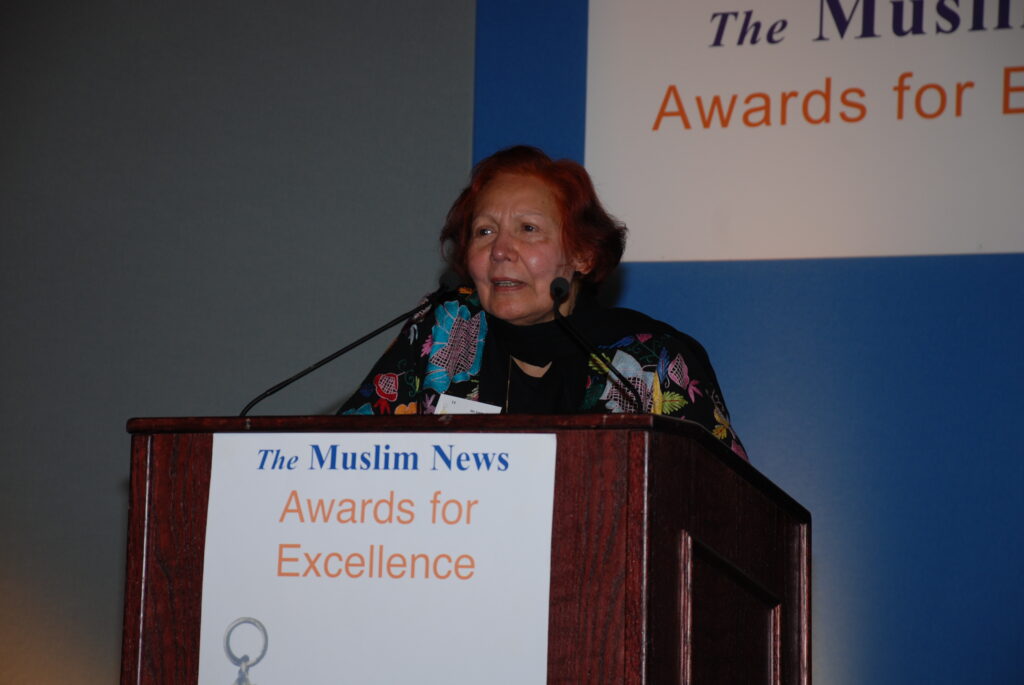
Mrs Saida Sherif, who passed away in London on 14th March 2023 at the age of 90, was a broadcaster, educationalist, relief worker and poet. She arrived in London from Pakistan on 29th May 1965, a single mother accompanied by two young children aged seven and eleven. The immigration officer at Heathrow gave her a grilling, but then relented on her entry given her eldest son was already at school in the country. She came with meagre finances, determined to give her family stability and security.
She soon found her feet in a clerical post at the Bank of England in 1967, that allowed her to purchase a semi-detached property with a garden in Dollis Hill. She was among the Bank’s first ethnic minority female employees, boldly donning a sari to work. She participated in the staff annual flower shows and on one occasion a senior official, Dick Balfour, brought some herbal plants from his own garden for her. To add to the family budget, she contributed to the BBC’s Eastern Service. After a day’s work, she would write her script for a three-minute broadcast in Urdu while on the double decker to Bush House.
Saida Sherif was born in the Muslim quarter near Delhi’s Red Fort in 1932. Her father, Qazi Shamsul Haq, was a poet and music lover adept at the reed organ. He inherited the title of ‘Qazi’ from his father, who was an Islamic judge and landlord in Saharanpur in the UP. Shamsul Haq was educated at the Anglo-Muhammadan College in Aligarh, though he left without a degree. In addition to the father’s farms in Sahranpur, his mother Mumtaz Begum had a haveli in maholla Chatta Momgaran, between Chitli Qabar and Turkman Gate. On the death of his father, Qazi Shamsul Haq found employment as a superintendent in the Deputy Commissioner’s office in Rohtak, East Punjab and later as Records Officer in Khetri, Rajputana.
Saida’s maternal grandfather was Syed Saeed Ahmed Ali Abidi, a court clerk in Delhi. Her grandmother was Maseeti Begum, daughter of Hafiz Ghiasuddin, also of Delhi. She was the family matriarch who had a haveli in Sui Walan. After early widowhood she raised a large family of nine daughters and two sons. One of these daughters, Razia Begum, was educated at a missionary school where she also later worked as a teacher.
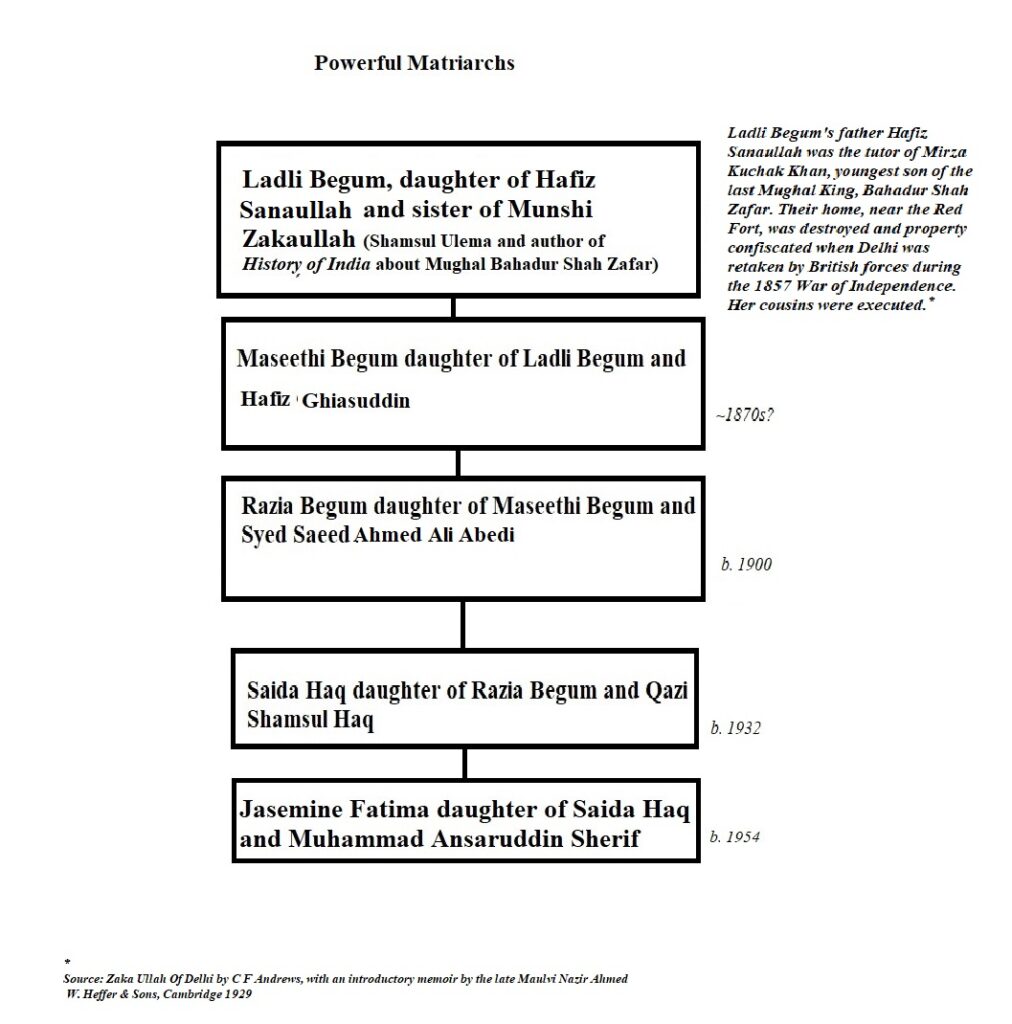
Razia Begum’s brother, Syed Sikander Ali, graduated from St. Stephen’s College, Delhi and joined government service, later long serving in the Intelligence department of newly formed Pakistan. Her other brother, Syed Asghar Ali, graduated from Anglo-Arabic College, Delhi and also Aligarh Muslim University. He later pursued a career in the Education Section of the Royal Navy and then joined the Pakistan army.
Around 1920, Qazi Shamsul Haq proposed marriage to Razia Begum. At the time he was also married to Amtul Shakur Begum, with a son, Riazul Haq, and two daughters, Shaukat Jahan and Husnara Begum. Riazul Haq served in the Nizam of Hyderabad’s Intelligence Department; Shaukat Jahan was a poetess, whose two daughters – Dr Ismet Siddiqui and Hamda Begum – and son, Saudul Haq Siddiqui, migrated to Pakistan in 1956. Husanara Begum, known to the family as Misya Apa, was widowed young, and also migrated to Pakistan with her children, Aslam Ansari, Afzal Ansari and Azra Begum.
Qazi Shamsul Haq and Razia Begum had five sons and then two daughters, Saida and Asifa. Her eldest brother, Inamul Haq, was educated at Aligarh Muslim University and served in the Education Department of Pakistan Air Force, retiring as an Air Commodore, but later appointed Director General of Punjab Public Libraries. There were close ties and mutual support between Qazi Shamsul Haq’s two families.
The 1930s were times of political tension. Saida’s first school was Jamia Milia in Karol Bagh, run by pro-Independence activists. Her classmate was the daughter of Zakir Hussain, a future president of India. The school had an innovative curriculum in which each child was given a garden patch to tend. She learnt to use the microphone to address the audience in the school hall and was soon hired for the children’s Sunday programme on All-India Radio, earning 5 rupees per show. The ethnic cleansing during the Partition in 1947 forced the family out of their ancestral home into a refugee camp, after which they embarked from Bombay for the sea journey to Karachi.
In 1948, she accepted the proposal of marriage from a family acquaintance who had recently been demobbed as a lieutenant in the Third Madras Pioneers, British Indian army. By the end of the year, she was in Switzerland with Muhammad Ansaruddin Sherif, who had been appointed Pakistan’s representative at the International Labour Organisation (ILO), an UN agency. It was a bittersweet period in her life, with challenges adapting to a different lifestyle, and much grief when Asifa died of a tumour.
In 1951, there was a brief pause in married life, when she lived in London with a brother who was training as an engineer. She also broadcast on the BBC programme In-se-Milye (Let’s meet) earning a fee of two guineas for fifteen minutes. She took a journalist course and worked in Selfridges’ bought ledger department. The ILO’s head was David Morse, a committed Zionist, who rebuffed those who crossed his path. Ansaruddin Sherif’s employment ended in 1957. On their return to Karachi, Saida became the family breadwinner as a ground hostess for Air France and French teacher at the city’s American School. Economic circumstances were dire and there were few options but to start a new life elsewhere. This was when she moved to England while her husband tried his fortunes in Canada.
Saida Sherif took early retirement from the Bank of England on medical grounds in 1979, by which time she had also been committing her weekends as a teacher at the weekend children’s classes at the Islamic Cultural Centre in Regents Park and other community centres in northwest London. She enrolled at the Willesden College of Technology for a further education teacher’s certificate, which she obtained with credits in 1984. She was as an evening college lecturer at the Aylestone Community School in Brent and taught Islam in English at an all-girls school in Jeddah from 1981-1983. This also gave her opportunities to perform the pilgrimages of umra and hajj. On her return, there were further part-time assignments, teaching at Harrow College and as a translator for the legal department of Harrow Council. Saida Sherif felt keenly about human sufferings and injustices and was much moved by the massacres in the Sabra and Shatila refugee camps in 1982. She supported the work of Dr Ang Swee Chai in providing relief to the survivors.
As a volunteer in the British charity ‘Convoy of Mercy’, Saida Sherif worked in refugee camps and rehabilitation centres in Croatia and Bosnia Herzegovina from 1992-94. Her English classes were open for children and adults, not discriminating between Bosnian and Croat refugees. She soon acquired a working knowledge of Bosanski and was a rare Muslim woman who comforted victims of Serbian sexual violence.
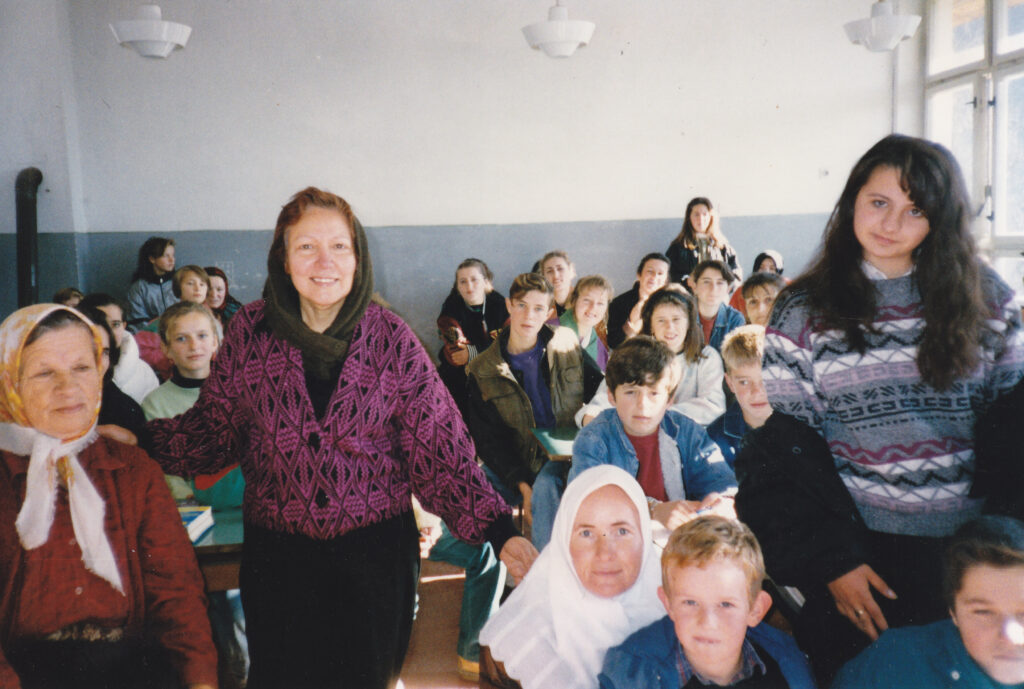
Buturović Polje, Bosnia and Herzegovina, in 1994.
She attended the UN briefings held near Split in Croatia to obtain information on roads there were open for the relief convoys and passed this on to the Muslim NGOs. She spoke up and challenged the authorities for discriminatory treatment towards Muslim convoy.
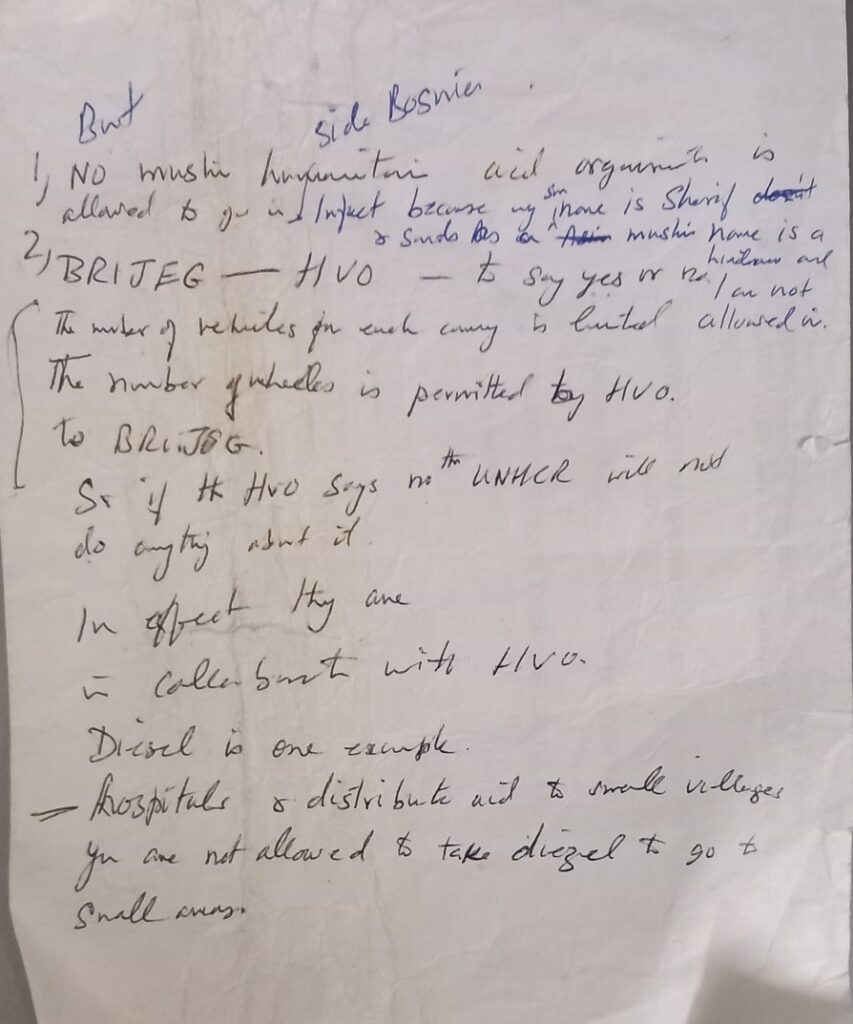
Notes made at a briefing session
She also made efforts to alert the UN Protection Force (UNPROFOR) of imminent threats to Bosnian Muslims and their heritage. June 1995 she was invited to speak at the international conference held in Sarajevo, ‘Education for a Culture of Peace’. Once the conflict ended in December 1996, with support of Reis-ul-Ulema Mustafa Cerić, she opened nurseries for children in Sarajevo and other towns, and also taught English to staff in Ministry of Religious Affairs. The winters and rough and ready living conditions took a further toll on her health.
These travels included sojourns where she could relax and gather her strength for a few months at her home in London. She was active in the Muslim Women’s Association and served as its religious advisor for some years. The Urdu Markaz run by Iftikhar Arif gave her a forum to present her own poetry and form friendships with a younger generation of Urdu-speaking literati in London at the time. She also supported the work of the Muslim Council of Britain and attended several of its annual general meetings, where again she did not hesitate to make her views known through contributions from the floor. Always an enthusiastic traveller, she had a canny way to obtain air miles from Qatar Airways and often visited the schools she had set up in Pakistan.
She was part of the Convoy of Mercy’s relief missions in support of Kosovar refugees in Albania, and later involved in projects in Prizren, Kosova in 2000, that included rebuilding of the Emergency wing of its hospital. The following year she was in Peshawar working with Afghan refugee children and distributing food aid to their families. In 2005 when a devastating Earthquake ravaged Northern Pakistan and Azad Kashmir she worked tirelessly in the refugee camps setting up make-shift schools in remote mountain-top settings. She travelled to Indonesia and taught in a school in a remote region, and later ran children classes for Chechen refugees in Baku. She was a keen campaigner for the Palestinian cause and the Save Chechnya campaign.
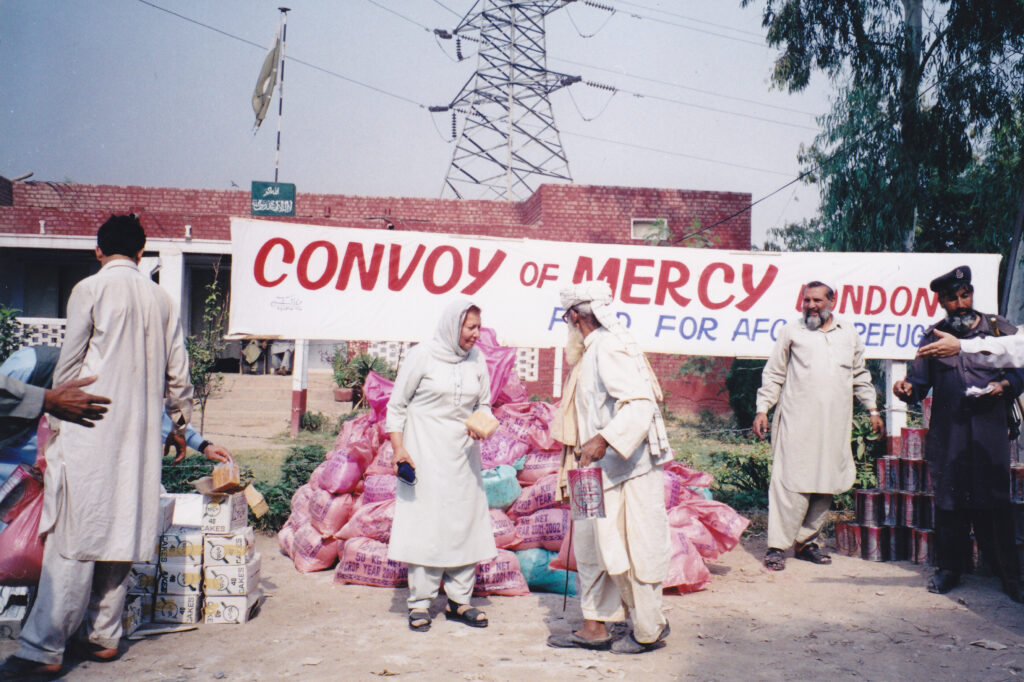
There were happier assignments in a country she came to love, Turkey, as an English language teacher at Sakarya University from 2007-2009. She was also warmly received by family friends in Doha and Islamabad, where she preferred to spend Ramadan. These were also working holidays as she remained busy providing educational advice. In 2013, now eighty years old, she embarked on a journey she had longed for – a visit to Bait al-Maqdis in Jerusalem.
Saida Sherif remained an enthusiastic gardener and much adept at do-it-yourself and woe betide the builder not up to scratch. She was welcoming to her children’s friends and hosted many a pleasant poetry recital and musical soiree, as well as sufi dhikr gatherings at her home in Willesden Green. For over twenty years, it was the venue of a family-oriented Sunday Qur’anic study circle, first led by Ustadh Saleem Kayani, and then Ustadh Noureddine Khallouki. In these, she was a keen listener, always ready to seek further explanations and clarifications. She remained eager to seek knowledge, attending Shaykh Haythem’s Utrujj Retreat in 2019 in her wheelchair.
By the 2020s she was the formidable matriarch in her own right with ten grandchildren and eleven great grandchildren. She bore her final years if ill health with fortitude, finding much solace in the Qur’an. She had always cared for the state of the ummah and it was now foremost in her prayers. She remained characteristically well-groomed and well-dressed to the end. The British heritage project ‘Everyday Muslim’ published a blog about her to mark the International Women’s Day 2023, that was aptly entitled, ‘Saida Sherif – The Twentieth Century Female Muslim Rebel with a Cause’.
The news of her passing away prompted condolences and a revival of fond memories from the many people across many continents whose lives she had touched and made a difference. Her work was recognised by the Pakistan’s Federation of Business and Professional Women in an award ceremony in 2003 and she was also recipient of The Muslim News Award for Excellence in 2007. Her acceptance speech recalled an encounter with a young man in Jablinica Hospital. It brought tears to her eyes and to many in the audience as well.
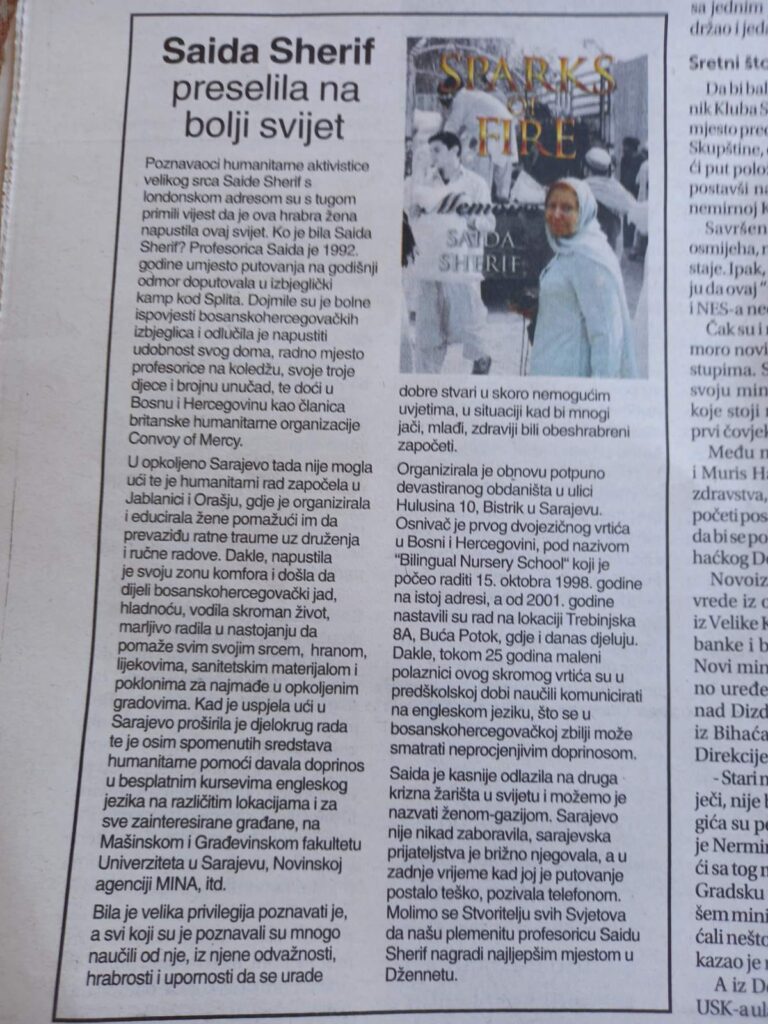
Her publications included a collection of poetry in Urdu and English, Kasak (2004) and memoirs, Sparks of Fire’ (Ta Ha Publishers, 2014). She was predeceased by her husband, Mohamed Ansaruddin Sherif, who died in Canada in 1969.
She was laid to rest at the Woodcock Hill Cemetery, Rickmansworth on 16th March 2023.
Her poem ‘In remembrance of a Bosnian Soldier’
If I go away
I will tell my friends
About Bosnia and her sons.
This land has so much beauty,
But is filled with war and misery,
This war is a crazy Milosovic frenzy.
The West has spread its ugly shawl,
And none comes to its call.
War like a crazy wild storm,
has become the norm.
In this horrible, stormy night,
unshaven, tired and hungry soldiers fight.
I hear the sirens, the shells and screams,
and share with the lonely mothers their lonely dreams.
Every day young Bosnians die,
everyday the graves are dug
where they lie.
Humiliation, sufferings and tears,
they don’t die.
Yes, I will tell my friends
About Vojink, whose name is too dear to tell.
He is young and handsome,
his blue eyes are sharp with a twinkle.
The world is at his feet,
but he likes nothing of this dunya, he repeats,
and daily makes a dua to be a shaheed.
He is ready to meet his Lord indeed.
He was wounded seven times round,
removed his shrapnels from his own wounds.
He jumps out of hospital bed when he comes around,
and rushes to the front on his round,
works nights and days,
This life is nothing he says.
The aim is Jannah,
The twinkle in his eyes return,
Peaches and cream,
One look? Passions burn.
I shake hands with him,
And silently pray,
May Allah give Bosnia
many more such sons.
11/12/94
A tribute from Asad Khan, founder of Convoy of Mercy
Saida Sherif was a mother figure, my sister in Islam and most importantly my friend.
The day she left, the world became a little poorer and empty place but she left many with knowledge, confidence, courage and purpose in life. She was loved, admired and respected by us all.
Though small physically she was hiding a colossal stature in courage, love, patience and understanding. A lady with true grit. Saida apa was a kind of person who comes to us in this world only once in a while. You can call them leaders, teachers, reformers and she was all of them. Saida apa inspired all she came in contact with and she became their role model but she was an act hard to follow. I am very privileged to have known Saida apa, my mother figure, my sister in Islam and of course my good friend.
I had the privilege of knowing her and working with her for 30 years of her life.
She started with Convoy of Mercy teaching young Bosnian refugee children in the camps of TTTS and Strobecs on the Dalmatian coast of Croatia. At that time there was much hostility towards Muslims who had escaped the horrors in Bosnia to become targets by the local Croatians. Saida Sherif provided the children a safe environment, love, understanding, confidence and courage to face their new circumstances. Saida Sherif was in charge of our Rehabilitation centre for the Bosnian wounded at Nemira near the city of Split, Croatia. Here she made friends not only with patients and staff but also the local Croats.
Convoy of Mercy moved its centre into Jablanica and Ostrozecs, Bosnia where Saida apa started her teaching programme in the civic centre, school and outlying villages.
With very little resources she repaired and refurbished a burnt out Serbian house and started another Rehabilitation and Convalescing centre at Ostrozec, Bosnia. With the arrival of doctor and dentist from Pakistan who stayed 2 years she was tasked with more responsibilities. All this, and more, was dealing with personal problems of local Bosnians and Convoy staff. She endured the cold Bosnian winters with only a wood burner and without minimal home comforts. It was the love of the people and love for the people that saw her through the harsh winters in Bosnian while the war raged on all around. May Allah have Mercy on her, rest her in peace, enlighten her grave, lighten her burdens and take her to the highest place in Paradise, ameen.
A shared anecdote from Shabbir Ahmed, who kindly took her to Jerusalem in 2013
We travelled over the River Jordon at the King Hussein Bridge border crossing, from Jordon into the occupied Palestine and were greeted by unamused Israeli border guards.
Auntie stood in front of a young Israeli woman officer with her passport to be allowed into the territories. A stern-faced officer started asking auntie about the reason for her visit.
Auntie carried a constant broad smile on her face and greeted the officer then made comments about her ‘beautiful looks’. On each question auntie made another remark about the officer and her looks to the extent that young officer seemed baffled and uncomfortable. Questioning was cut short; auntie was issued with the visa.
It was quite a sight to see how confident auntie remained especially when the environment was nothing short of hostile.
Links
Obituary in The Guardian, click here
Obituary in The Muslim News, click here
PP Jaseem’s profile in TRT Worldm 2011, click here
Tabassum Hawa’s interview for EveryDay Muslim, click here
